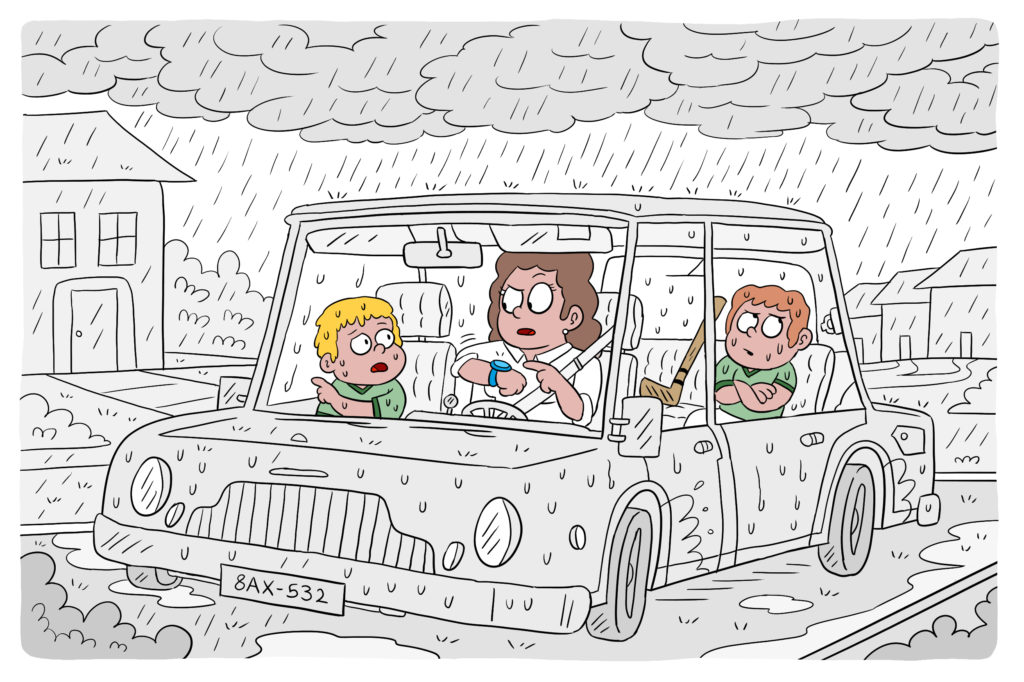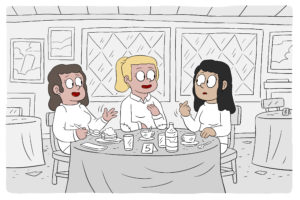
Alexandra was born in Athens, Greece. Last year she decided to follow her dream: Becoming an Au Pair in the Netherlands. Within a few months, she found a host family living just outside Amsterdam. The host parents are ambitious and both have careers. They chose to live in the suburbs so they could give their children, Remco and Rogier, who are now 16 and 15 years old, more freedom while they are at work. Last week, Alexandra took the brothers to their weekly field hockey practice. She dropped them off in the parking lot, and agreed to meet again at that same point at nine o’clock after practice. Picking them up that night runs a little differently.
Alexandra is there five minutes early to pick up the children and to make sure the boys will see the car as they leave the field hockey club cafeteria. It was raining very hard that day. Alexandra was already expecting the brothers to be a little later than usual. After half an hour of waiting in the car, she became very worried anyway. After 45 minutes, the brothers finally came out of the canteen and ran to the car.
Alexandra is angry. “Those kids are so nice and active. I really like them,” she thinks as she sees the children running toward the car. “The only thing is that sometimes they don’t understand the responsibility I feel when I take care of them, I mean, they just don’t understand how many things can happen and they don’t worry about it. And they don’t care that I might worry about it!” The boys throw open the door and slide inside. Soaking wet. Alexandra addresses them immediately: “I was supposed to pick you up here at nine! I waited for three quarters of an hour! I was very worried!”
Remco remains calm. “We had to put all the stuff back in the garage, it was our turn to do that.”
“Why is Alexandra so angry?” he thinks. “I don’t understand that. We were on the field hockey field, it’s a safe place. Alexandra left us here at the beginning of our training, why would she worry that we’re not here anymore? Sometimes she panics for no reason.”
Where is the connection?
This story shows that Alexandra has a different view than the boys of danger and of what is agreed upon. Alexandra feels very responsible. This makes sense, but she was raised in an environment where something that is unknown can also be dangerous. Unknown in the sense of not knowing what the boys are doing and why they are late. The boys, on the other hand, cannot imagine anything bad happening to them while they are doing their chores on the field hockey field, and because they are young, they actually forgot about it themselves and did not inform Alexandra in advance. Nor did it occur to them to send a message or walk over to the car.
Something is handled differently in different cultures. In some cultures it is dangerous and others are easier about it, often calling it interesting, or seeing where the ship runs aground. In Holland, as well as India, parents let their children go out and explore the world. In other cultures, such as the Greek, there is a greater need for structure and control, and parents are more inclined to warn their children about the dangers in the world. In this story, Alexandra feels that the children she cares for are too free and do not take all the dangers into account. She experiences more stress when arrangements with the children for pick-up are not kept.
There is no reason for Alexandra to get angry, and hopefully she can let go of the worries a bit. But, of course, she can also tell the boys that it is very important for her to let them know if plans change.
Read more about the social dilemma at play here: uncertainty avoidance
Important to know:
This anecdote is based on stories shared with us. Connect2Us strives to highlight the dilemma from both sides and not to label people or suggest that one or the other should behave differently. We see in our daily cross-cultural work that awareness by those involved is enough to move toward each other without pretending to be very different. Connect2Us wants to help readers recognize and avoid prejudice. Read about prejudice, discrimination and racism here.

